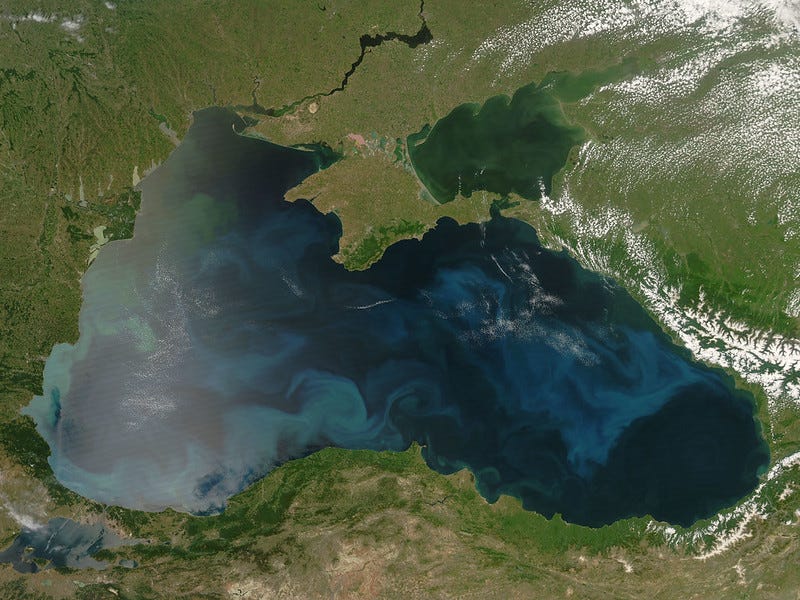The Black Sea Has Always Been a Global Trade Engine Running on Grain as Fuel
On war, geography, and food systems
Originally posted in July 2022 when I had 125 subscribers. Now paywalled and updated.
Surveying the Eurasian landmass, the only substantial region of fertile black dirt is a streak that runs right through southern Russia and Ukraine. Contested parts of Ukraine today have always been a breadbasket because of this soil, known to locals as chernozem. This is the deep history of human contact with that geography.
PREHISTORY. Slowly, from some unknown beginning that is impossible to describe in any detail, a regional trading market came into existence before the invention of money. Steppe peoples encountered the neolithic farming revolution very early here and it fueled their cultural expansion. Seafaring already existed in the Black Sea and Mediterranean, so the regional economies connected by 2000 BC. One effect of this phenomenon was the spread of Indo-European languages along with the new trade patterns. Another was the spread of burial practices, such as mounds covering leadership figures with weapons and wheels and horses and slaves, that have developed into modern burial practices in the western world today.
Most human migration and settlement seems to have followed along coasts and waterways. Even today, most of the world’s largest and most productive cities are located within sight of shore or along a river on which grain and other raw materials travel in bulk. No one had invented writing yet, so we have no first-hand accounts of this world, but we know it existed. As cities grew, so did populations dependent on cheap and plentiful bread. Communities on the littoral could access the larger market in a time of local shortage, making up for crop failures by sailing in search of a surplus to beg, trade, or steal. Like Egypt, where prevailing winds run contrary to the flow of the Nile so that ships can go both ways with some predictability, the Black Sea gave people a way to avoid or reduce famine, carving out places where societies could thrive rather than die out in boom-to-bust cycles.
The Black Sea acted thus as a natural cul-de-sac in which neighbors could share resources. As it filled with possibility, that grain-filled pocket of geography spilled out through the Hellespont into the next neighborhood. This was a slow process that moved at the speed of paddles, oars, and sails. Only with the invention of the telegraph was war in Crimea able to spark bread riots in Paris and financial panic in the United States the same day in 1853. Yet we can already discern that grain prices in one locale responded to conditions in distant lands.
As historians Ovidu Crisstea and Liviu Pilat explain in From Pax Mongolica to Pax Ottomanica,
From Antiquity to the present day, this “advanced gulf” of the Mediterranean into continental Europe has been a crossroads of important trade routes. It has also been a stage for power struggles between empires, civilisations and religions, which means a close connection between war, religion and trade. That is primarily why most historians of the Black Sea … have typically focused on political, strategic and commercial aspects of Pontic history.
The famous myth of King Midas can be read as an acknowledgement of food insecurity in the Cycladic world of prehistoric Greece, a reminder of the limited “value” in gold coins where there is no bread to buy. Joseph traveled to Egypt, which was “never without grain.” Whether we believe the Old Testament story or not, it resonates with what we know about travel and migration in prehistory. The Black Sea was part of this story from the beginning of writing. Humanity’s first society to develop goldsmithing, the Varna culture, appeared on the coast of modern Bulgaria after 5,000 BC. Gold thus changed hands over grain from its beginning.
Herodotus tells of Lydians drawing lots in time of famine to divide themselves into two groups, with half migrating to Italy and the other half staying to fare better on the remaining food supply. Whatever its historicity — and Herodotus is not without dubious details — this myth also carries a true spirit of the prehistoric world in which hunger was a regular event that only prior planning and long-term policy could prevent. They were technologies, and like any technology, they were perfected only over time and as demand warranted.



